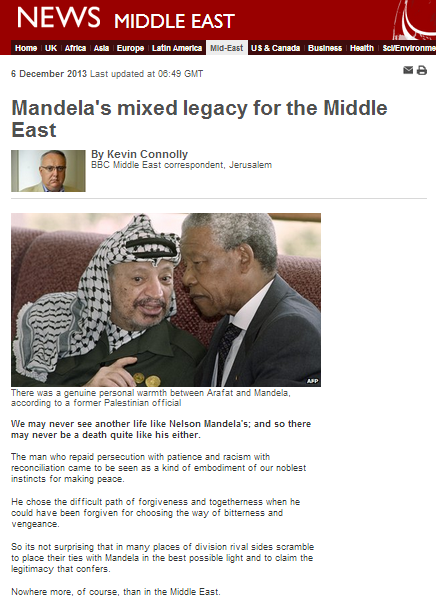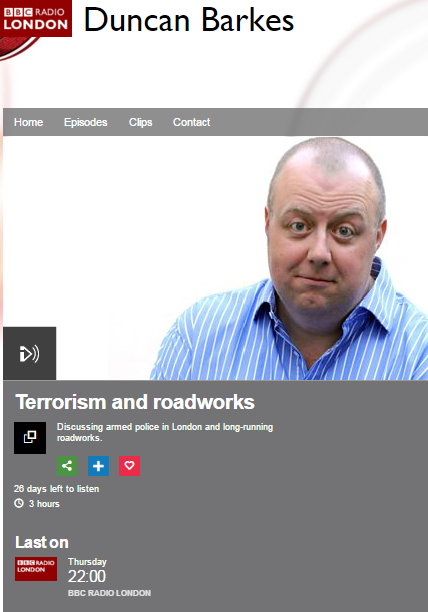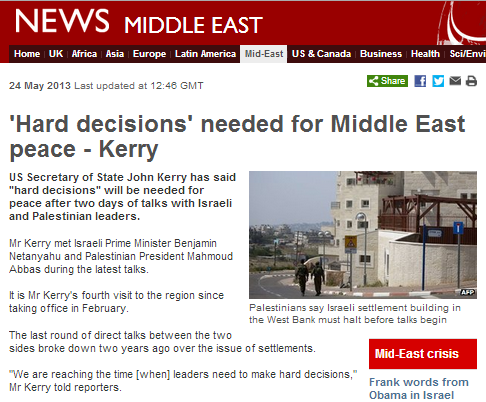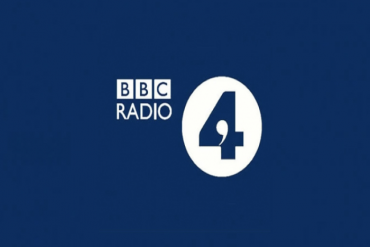On December 5th, as news of Nelson Mandela’s death became public, Ben Cohen opened an article which is well worth reading in full with the following words:
“In the coming days, there will be much reflection on the life and legacy of Nelson Mandela, following the former South African president’s passing on Dec. 5. And in the coming weeks, we can anticipate a febrile exchange over his true views on Israel and the Middle East.”
With remarkable alacrity, one of the first out of the stalls was the BBC Jerusalem Bureau’s Kevin Connolly, with an article titled “Mandela’s mixed legacy for the Middle East” which appeared in the ‘Features & Analysis’ section of the BBC News website’s Middle East page early on the morning of December 6th.
Frankly, it is difficult to imagine a more cynical and opportunistic exploitation of Mandela’s death in order to promote an unrelated political agenda than that which is on display in Connolly’s article. And yet, that screed must have presumably passed the ‘safety nets’ of editors and Connolly’s bureau chief before publication.
Connolly’s overall message to BBC audiences is distilled into one of the sentences he writes:
“The Palestinians have the easiest case to make in claiming Mr Mandela’s blessing for their cause.”
Euphemistically filing a terror organization responsible for the deaths of civilians – including many children – under the fuzzy heading “liberation movement”, Connolly writes:
“During his long years in jail as an ANC prisoner he [Mandela] was embraced by the PLO leadership as a fellow-fighter in a kind of global family of liberation movements.”
Having conferred legitimacy by association on terrorist leader Yasser Arafat by repeating anecdotes concerning alleged “genuine personal warmth between Arafat and Mandela that underlined the political link between them”, Connolly moves on to Israel.
Again, audiences are left in no doubt as to the direction in which Connolly seeks to herd them:
“At a moment when anyone with a claim to a share in the Mandela legacy is proud to make that connection, Israel has a painfully difficult case to make.”
However, Connolly’s ‘supporting evidence’ for that statement is largely based upon cherry-picked information and a speculative non-story promoted by the Guardian in 2010.
“It [Israel] was a close, if secretive, ally and arms supplier apartheid South Africa and there is a good case to be made that Israeli support helped the all-white regime in Pretoria to last longer than it otherwise might have.
There have been stories – which are difficult to substantiate definitively – that the co-operation extended into Israel sharing nuclear weapons technology.”
Connolly’s claim that “Israeli support helped the all-white regime in Pretoria to last longer than it otherwise might have” appears to have been resurrected from a Guardian article by Gary Younge dating from 2010 in which it was written:
“Throughout the 70s and 80s Israel had a deep, intimate and lucrative relationship with South Africa,” explains Sasha Polakow-Suransky, author of The Unspoken Alliance: Israel’s Secret Relationship With Apartheid South Africa. “Israel’s arms supplies helped to prolong the apartheid regime’s rule and to survive international sanctions.”
As was noted by Cif Watch at the time:
“Anyone with the slightest knowledge of South African armaments knows that most of its weapons came from Britain, France and Belgium and were in service at the time of these discussions – for example, the South African Airforce at the time used English Electric Canberra bombers (Period of Service: 1963 – 1991), British Hawker Sidderley Buccaneers (Period of Service: 1965 – 1991) and French Dassault-Breguet Mirage fighters (Period of Service: 1965 – 1986) and the army used Belgian FN rifles and machine guns and British-made Alvis Saracen “88″ Prototype used extensively to suppress riots in the townships – yet neither Younge nor the Guardian claims that these massive amounts of weaponry, dwarfing anything Israel may have provided, imply that Britain, France and Belgium are or were apartheid states.”
Likewise, Kevin Connolly revealingly refrains from making the accusation that Britain, France and Belgium “helped to prolong the apartheid regime’s rule”: BBC audiences are led to believe that only Israel belongs in that category.
Connolly’s suggestion that “the co-operation extended into Israel sharing nuclear weapons technology” is also apparently based on the Guardian’s speculative accusations dating back to 2010. Readers can learn more about the flimsy nature of that paper’s insinuations from work done on the subject by CiF Watch here and here and further information (including the BBC’s own questioning of the Guardian story at the time) is available here.
Connolly’s ‘disclaimer’ in the form of the words “which are difficult to substantiate definitively” does nothing to mitigate the fact that he is knowingly recycling a story discredited over four years ago in order to promote a specific agenda which has its roots in the delegitimisation of Israel for political purposes.
The gravity of such blatant breaches of the BBC’s editorial guidelines on both accuracy and impartiality (which should render Connolly’s position as a Jerusalem Bureau correspondent untenable – but most likely won’t) is shadowed only by the gross bad taste of Connolly’s cynical exploitation of the occasion of Nelson Mandela’s death as a hook upon which he hangs his opportunistic political campaigning.






